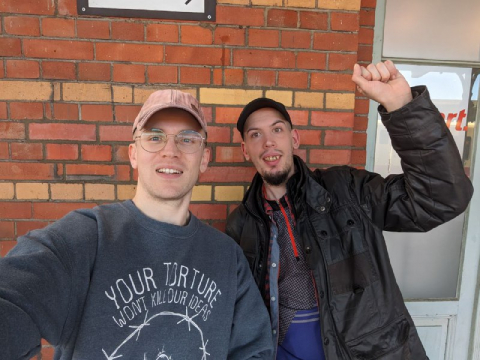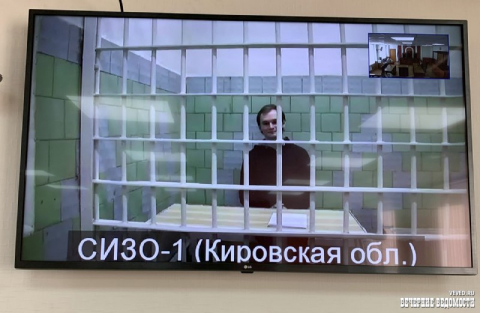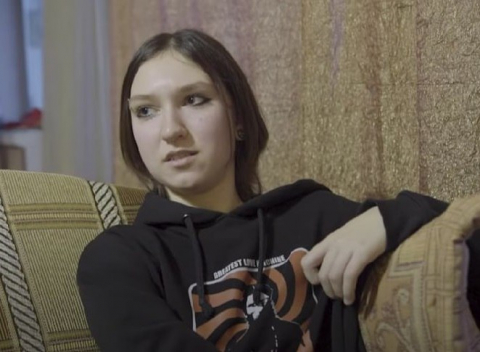Russia’s Anarchist Black Cross

From Freedom News UK
Original title: Through war, despotism and social change: Russia’s Anarchist Black Cross
Features, Aug 30th
For this year’s International Anarchist Prisoner Solidarity Week, Freedom interviewed the Anarchist Black Cross-Moscow to discuss their long history in Russia supporting imprisoned Russian anarchists, the challenges they face under Putin’s regime and their work during the war on Ukraine.
Russia has a long history of repressing both political prisoners and activists advocating on their behalf. In fact, Russia is the birthplace of the Anarchist Red Cross, which later became the Anarchist Black Cross. Can you tell our readers about the ABC’s historical origins, activities, and importance in Russia?
It was usual in the 19th century that groups supporting political prisoners called themselves the “Political Red Cross.” One such organisation helped Pyotr Kropotkin to escape from prison in 1876.
Tens of thousands were imprisoned in Russia after the revolutionary events of 1905-1907, and the need for prisoner advocacy increased. Anarchists felt that the Political Red Cross was giving priority to other socialist prisoners over anarchists, and anarchists established their own organisations in Russia and internationally, which were especially active in centres of Russian and Jewish emigrants in the UK and USA. After the 1917 February Revolution and the liberation of all political prisoners in the former Russian Empire, these organisations ceased their activities. But already in the spring of 1918, anarchists had to set up new organisations to support their comrades repressed by the Bolsheviks. They established themselves now under the name Anarchist Black Cross (ABC).
The Anarchist Black Cross’s activities in Russia are now pretty much the same as they were 100 years ago — providing financial support to prisoners and corresponding with them. The only difference is that in the first half of the 20th century, there were hundreds of anarchist prisoners in Russia, whereas currently, there are less than 20.
Gradually, anarchists in the Soviet Union were imprisoned and forced to emigrate, and support organizations were based abroad. Organisations such as the Support Fund of Alexander Berkman did not use the ABC label, but they were part of the same lineage.
During the great purge of 1937, contact with most of the anarchist prisoners was lost as they were executed. Around 1940, all prisoner correspondence outside the USSR was banned. Support for anarchist political prisoners in the Soviet Union became impossible, and the focus of solidarity moved to other countries, such as anarchist prisoners in Spain.
The Alexander Berkman Support Fund continued its activities until the 1970s, while the first modern group using the ABC name was established in London in 1967 by Albert Meltzer, Stuart Christie, and others. Groups quickly spread to Italy, Germany, and other countries, and since then, there has been a continuity of groups working under the ABC name.
Can you tell us about ABC-Moscow in particular? When and how did it start? What are your founding principles? Did you face any initial organizational obstacles?
Anarchist Black Cross-Moscow was established in 2003, in the aftermath of the trials against members of the New Revolutionary Alternative (NRA). The NRA was an armed group consisting of both anarchists and authoritarian Marxists, which engaged in a symbolic bombing campaign in Moscow and the Moscow region. The most notable action of the group was the bombing of the FSB security services reception building next to Lubyanka Square in the center of Moscow in 1998. We were supporting anarchist members of the NRA and decided to establish a more longstanding group also to support anarchist prisoners abroad.
Our basic statement can be found on our website and has not changed much over the last 20 years. It outlines who we support:
“We support all anti-authoritarians, and their supporters who are persecuted due to their political activities or acts which do not contradict the ideal of anarchism. And whenever possible, we support also prisoners who became anti-authoritarians during their sentences, so-called “social prisoners” who were forced to break laws for subsistence or in the fight against the despotism of the ruling class, and prisoners who fight against the prison-industrial complex from the inside.”
In practice, we have never been able to support all the listed groups.
Until this year, we almost never faced serious challenges from the side of the authorities. In the first years, there was a case when a comrade was arrested in Yaroslavl after receiving our materials, and officers beat him in order to find out who was behind ABC-Moscow. But besides this incident, there was never a serious threat against our group and, until 2022, we were not that much concerned about our security, although the group was never working openly.
Now, after 21 years, we are one of the oldest Anarchist Black Cross groups in the world, perhaps aside from the Brighton group, and some sections of the Anarchist Black Cross Federation in the United States are older.
In the post-Soviet period, when did the incarceration of anarchists begin? Have the authorities consistently targeted anarchists, or has the level of their incarceration worsened over time?
Struggles for anarchist prisoners in new Russia started pretty much immediately when it was established. The first major campaign was for Rodionov and Kuznetsov, two punks accused of defending themselves with a razorblade and penknife against police attacking a demonstration for victims of the Soviet terror in March of 1991. The campaign kicked off in February 1992 after their sentences, less than two months after the collapse of the Soviet Union. The solidarity campaign got widespread attention and was successful in shortening the sentences.

Before the NRA case in 1998-1999, there was the Krasnodar case, when anarchists were accused of plotting to murder the conservative Krasnodar governor Kondratenko. Larisa Schiptsova (later Romanova) was defended by the lawyer Stanislav Markelov (murdered by Nazis in 2009) and received a probational sentence. Romanova was eventually sentenced to six years in prison in the NRA case.
In the second Krasnodar case in 2004, authorities planted drugs on two editors of the Avtonom journal, established in Krasnodar in 1995. The editors received short sentences in a low-security prison, and the journal was forced to move to Moscow.
For about 20 years, Avtonom was the anarchist journal with the biggest print run, but publication had to cease after the full-scale invasion in 2022. Until then, the journal did not have major problems with the authorities, although three issues were banned.
Anarchist Black Cross-Moscow always worked in close cooperation with Avtonom. The journal published materials provided by the Black Cross and ABC-Moscow maintained special sections on the Avtonom website. Around Avtonom, the libertarian communist group Autonomous Action was organized. Autonomous Action was the largest anarchist organisation in Russia until the whole concept of organisation declined in the anarchist movement in the 2010s. Anarchist Black Cross-Moscow cooperated closely with Autonomous Action.
In the early 2000s, state repression against anarchists and anti-fascists was not continuous, and ABC-Moscow had more time to join international struggles. For example, in 2005, we visited the court session of Spanish anarchist fugitives José Fernandez Delgado, Gabriel Pombo da Silva [pdf], and their comrade Bart De Geeter in Aachen and translated news about this and other cases against anarchists from around the world.
Pavel Delidon was an anarchist comrade who was sentenced to four-and-a-half years in 2007 after attempting to appropriate wages owed by his boss in Stariy Oskol. The case was important for revitalising the Anarchist Black Cross, as his friends in Moscow decided to join the group to organise support for him. Delidon was also defended by Stanislav Markelov.
In the last years of the 2000s, the Anarchist Black Cross was mostly busy dealing with repressions against Antifa. Antifa first appeared in Moscow, Volzhsk, and Krasnodar in the late ’90s. The scale and intensity of the confrontations with Nazis gradually grew until Nazis began targeted assassinations against anti-fascists in Moscow and St Petersburg. Previously indifferent authorities got involved, and a number of anti-fascists were imprisoned.
Stanislav Markelov was often the chosen lawyer for Antifa and was also an activist of the movement itself — he anonymously wrote the Red Book of the Anti-fascist, a small pamphlet to outline the principles of the struggle. Markelov was not an anarchist himself but a leftist anarchist sympathiser who was well-read in the history of the movement. He ended up on the Nazi hit list and was murdered in 2009 together with Anastasia Baburova, an anarchist and member of Autonomous Action. The murder of Markelov was a huge blow to ABC-Moscow, from which we still have not recovered, in the sense that we have never since had such a trusted lawyer comrade. Although Markelov did not provide his services for free, it is very challenging to find a lawyer who understands how to defend political people with political charges.

The Network case against anarchists in Penza and St Petersburg in 2017-2018 was a major turning point for worse. Although Islamists, National Bolsheviks and Nazis were routinely tortured for confessions already 20 years ago, this was the first time anarchists were targeted with systematic torture in contemporary Russia. The case galvanised the anarchist movement, and for a few years, most of the movement was involved in the defence campaign, which eventually proved fruitless – all the accused received exactly the sentences demanded by the prosecution and apparently decided by the FSB.
The torture and harsh sentences were probably the authorities’ revenge for the wave of insurrectionary direct actions by anarchists across Russia in 2008-2014, for which no one was ever caught. Another blow for the movement was the revelations from one of the fugitives of the Network case that some of the accused were connected to a drug-related double homicide case in Ryazan in 2017. Although most of the accused had nothing to do with the homicides, this caused solidarity among the wider Russian opposition movement for the accused to pretty much vanish.
Failure to stop the Network case set up the pattern to come. In 2022, authorities fabricated another underground “anarchist organisation,” this time in Tyumen, Yekaterinburg and Surgut (the Tyumen Case). All the accused were tortured, and the case is currently in court. Now, any anarchist targeted by authorities may expect torture, trumped-up charges and decades in prison.
How do you define prison abolition, and how do you explain the importance of this goal to people who may have never encountered this idea before?
We are against all prisons, but unlike many other Anarchist Black Cross groups around the world, we have never concentrated much on criticism of incarceration and its alternatives, restorative or transformative justice. Our work concentrates on very practical support work for repressed comrades, so, unfortunately, we cannot give a smart answer to this question.
We do not believe in any kind of restorative or transformative accountability process with Putin and his Chekist, oligarch and mafia friends. Instead, there will be a severe retribution. However, currently, we are so far from this goal that it is pointless to discuss what could be a proper punishment for them.
What services does ABC-Moscow provide for anarchist prisoners? What types of events do you organise?
We are a small group, and we seldom take care of complete cases of repression – more often, we are a sort of information and financial clearinghouse between the international anarchist community and friends and family who are providing lawyers and parcels for prisoners. Often, the biggest financial burden of the defence is on the families of the prisoners. A number of more known prisoners have specialised support groups and campaigns, and we try to spread their fundraisers and other news.
It is still possible in Russia to organise prisoner support events, such as letter writing, movie screenings, and concerts, although they are sometimes raided by authorities. However, due to the increased attention toward our group, we do not organise such events or any offline events with the name of our group.
Are there any notable successes of your organisation or particular cases you would like to highlight?
It has always been quite uncommon to have someone released due to a support campaign. Usually, we have to be happy with more modest “successes,” such as providing a prisoner with a lifeline through lawyer visits and letters.
One exception was the Khimki case, in which anti-fascists Alexey Gaskarov and Maxim Solopov were accused of organising a riot against the municipal administration during a 2010 campaign against the construction of a new motorway from Moscow to St Petersburg. Gaskarov was found not guilty, and Solopov got a very lenient two-year probational sentence. Although, it is hard to say how much of this was due to the support campaign.
How has the war in Ukraine impacted ABC-Moscow’s ability to function inside Russia? In early 2024, the Russian Federation designated the Anarchist Black Cross as a so-called “undesirable organisation.” Does this label apply to local chapters of the ABC inside Russia, and has it had any practical impact on your work?
We are not planning to find out if this label applies to local chapters inside Russia!
Actually, it was the Anarchist Black Cross Federation (ABCF) of the United States which was labelled “undesirable.” It might have been a donation by the Los Angeles section to us which provoked this move by the Russian authorities. We do not know if the Russian authorities are aware that the ABCF is mostly busy with domestic cases inside the US, and all the Anarchist Black Cross groups in Europe and Russia work independently from each other and are not federated. But obviously, the goal of this move is to target all Anarchist Black Cross groups inside Russia with repressions.
This has been a serious alert to us. Perhaps an even more serious warning sign was the torture of anti-war activist Vladimir Sergeev. Sergeev was sentenced to almost eight years in prison for an attempt to torch a police car at an anti-war rally in Moscow. After his sentencing, he was sent to spend his sentence in Siberian prisons. While he was staying in Krasnoyarsk prison in February, he was tortured as authorities were pressuring him to cooperate with the prison administration.
He was one of the first known anti-war direct action prisoners, and originally, support for such prisoners was provided under the ABC label. However, eventually, a separate support organisation, Solidarity Zone, was organised by anarchists for anti-war direct action prisoners — most of these prisoners are not anarchists.
Apparently, letters from the ABC were still interesting to the authorities almost two years later, and Sergeev was interrogated about the ABC, among other things. This was another sign that the authorities are planning to crush all the ABC’s activities inside Russia.
Due to this, we have been forced to seriously increase our security concerns, which has hampered our ability to take new cases and caused other difficulties. Currently, all of our members have been forced to move out from Russia, and we are able to do much less work than before, although the number of both anarchist and direct action prisoners is only growing.
Do you coordinate your activities with other groups? How do you promote solidarity with international ABC chapters?
We exchange information with other ABC groups. There are various initiatives to make cooperation between ABC groups more effective, such as the International Anarchist Defence Fund, but our participation with these initiatives has been limited.
Unfortunately, for a long time, we have been fully occupied with issues of repression in Russia and mostly unable to provide solidarity to anarchist prisoners in other countries.
How can the international community best help your organisation and imprisoned Russian anarchists?
Three main ways are to spread information, send support mail to prisoners, and donate to lawyer costs and parcels.
For news, you may check the English news section of our website. Although the Russian version is updated way more often and can be followed with auto-translation.
You can also find the current list of prisoners we support with their mailing addresses on our site.
With the service Prisonmail.online, you can send mail to many Russian political prisoners online. It has an English interface. The letters should be in Russian, though, but you may use various automatic translation services, which nowadays may provide pretty good translations. Note that many countries in Europe have halted snail mail service to Russia.
Choosing a prisoner for regular correspondence is a neat way to show solidarity if, for example, one’s life situation makes it difficult to join a group.
Our donation guidelines are here: https://wiki.avtonom.org/en/index.php/Donate
Any final comments for our readers?
Thank you for the interview! The number of anarchist prisoners has grown not only in Russia but in many other countries as well. Keep supporting your local ABC chapters!
~ Interviewed by Sean Patterson
ABC Moscow update on anarchist and anti-fascist prisoners 8/2024

From avtonom dot org
Welcome to our latest news compilation on imprisoned anarchists, featuring the rescue of Denis Kozak, the release of Lev Skoryakin, the new sentence for Azat Mifthakov, the ongoing case of Yuri Mikheev and the significant case of the Chita anarchists.
We have not compiled a report since December 2023, due to problems that are explained in our interview by Freedom. So this time we are making a quick recap on most important events concerning anarchist and anti-fascist political prisoners during last 8 months.
Denis Kozak has left to Europe. He was arrested in Kazakhstan at Russia's request

Russian anarchist Denis Kozak has been safe since 27th of March. Kazakhstan International Bureau for Human Rights with the support of the UNHCR managed to secure Denis's release and arrange for the activist's departure to EU.
Recall that Denis was prosecuted for "justification of terrorism" due to commenting about Mikhail Zhlobitsky, anarchist who bombed FSB offices in Arkhangelsk in 2018, in social media VKontakte. In June 2022. Denis left Russia, but on February 9, 2023 he was detained in Almaty at the request of the Russian Federation. Later a Kazakhstan court extended his arrest for 12 months for violating the rules of stay in the country. In January 2024, Kazakhstan denied Kozak refugee status.
Denis Kozak was involved in the administration of telegram channels Anarcho News, Russian Syndicalism, REVANCHE and has done a lot to support other anarchist political prisoners.
Lev Skoryakin was released in the courtroom

15th of December last year, The Gagarinsky District Court of Moscow sentenced anarchist and activist of the "Left Bloc" Lev Skoryakin to a fine of 500,000 rubles but released him from payment due to the time he spent in pre-trial detention. Lev was released in the courtroom. The prosecutor had requested a 5-year prison sentence for the activist, but Skoryakin pleaded guilty despite not participating in the action and refused to provide further explanations, closing arguments, or a final statement.
The activist's lawyer, Evgenia Grigorieva, asked the court to impose a non-custodial sentence.
In December 2021, Skoryakin and Ruslan Abasov, the second defendant in the case, were detained and arrested on suspicion of involvement in hanging a banner with the inscription "Happy Chekist Day" and setting off a flare opposite the FSB building in Moscow. They were later released from pre-trial detention with restrictions on certain actions, and the activists emigrated. In November 2023, Lev Skoryakin was abducted in Bishkek of Kyrgyzstan and forcibly brought to Russia, where he was subjected to torture.
At the court session, the prosecutor read the interrogation protocol of the prosecution's witness, Umar Balurov, who was a minor at the time of the events. Balurov testified against Skoryakin, claiming that he distributed flares to the activists. As a result, Balurov's status changed from defendant to witness. Ruslan Abasov and the activists' defense deny Skoryakin's involvement in the action.
26th of March Skoryakin managed to migrate to EU.
Write to Russian prisoners from abroad
New payment service https://prisonmail.online/ makes it handy to write to Russian political prisoners from abroad. You may pay the fee with a non-Russian credit card, and also follow the delivery status of your letter.
The service does not cover all the prisoners, but you may always check if the service covers the prisoner you would like to write to.
Note: you need to write in Russian. Use DeepL or Google Translator for that.
Azat Miftakhov sentenced to 4 years of imprisonment

Azat, a political prisoner and former graduate student at Moscow State University, was detained on September 4, 2023, immediately upon his release from a previous prison sentence of five years in Omutninsk, Kirov Region. Shortly before his release, he was added to Rosfinmonitoring's list of extremists and terrorists. The new charges of "justifying terrorism" are based on alleged comments he made about anarchist Mikhail Zhlobitsky, who bombed FSB offices in Arkhangelsk in 2018 during a TV show viewing with other inmates.
On March 27, a secret witness testified, claiming that Azat spoke against Russia's invasion of Ukraine and referenced Zhlobitsky's terrorist act. Azat and his defense dismissed the witness's testimony as false. During his own testimony, Azat denied making any statements justifying Zhlobitsky's actions.
On March 28, closing arguments began, with the prosecutor requesting a 3-year prison sentence. On the same day, Azat Miftakhov was sentenced to 4 years of imprisonment, with 2 years and 6 months to be served in (high-security) prison and the remaining time in a strict regime colony.
You may write to Azat do address
Miftakhov Azat Fanisovich, 1993 g.r.
FKU SIZO-4 GUFSIN Rossii po Sverdlovskoy oblasti,
ul. Urickogo d. 16B, g. Kamyshlov, Sverdlovskaya oblast
624860 Russia
Note that all letters should be written in Russian – you may use Google Translator or DeepL. From countries which have halted mail services with Russia, you may send an e-mail via ABC-Moscow: abc-msk@riseup.net.
The case of anti-fascist Yuri Mikheev

10 November 2023 19 years old Yuri Mikheev was arrested along with Matvey Melnikov at a military base in the Moscow region. The FSB accused them of planning to set fire to military equipment, including a 40V6 mobile tower, that is part of the S-300 missile system.
Yuri Mikheev, an anti-fascist who opposes Russian aggression against Ukraine, is now facing criminal charges for preparing to commit sabotage and has been placed in pre-trial detention, facing up to 10 years in prison. His arrest, along with the Melnikov brothers, is suspected by "Solidarity Zone" to be a provocation by security services.
On July 8, the Meshchansky District Court of Moscow extended the detention of Yuri Mikheev and the Melnikov brothers for another three months. Mikheev and Matvey were initially arrested on November 11, with Timofey Melnikov detained later on November 22. All three are charged with preparing for "sabotage" and could face up to 10 years in prison. Reports indicate that at least two of the defendants were tortured to extract confessions.
"Solidarity Zone" is raising funds for Yuri Mikheev's legal defense, but they still need more than 1900 euros to cover legal costs for the next months.
PayPal: solidarity_zone@riseup.net (sign as "for Mikheev")
Cryptocurrency (write solidarity_zone@riseup.net, if transferring):
Monero: 4B1tm6boA5ST6hLdfnPRG2Np9XMHCTiyhE6QaFo46QXp6tZ7Y6nJjE43xBBTwHM84bWwexR8nS4KH36JHujjc1kC8j2Mx5e
Bitcoin: bc1qn404lrshp3q9gd7852d7w85sa09aq0ch28s3v4
USDT (TRC20): TRcCUHKSMY7iLJPvbDxLc6ZnvAud72jTgj
Mikheev is supported by Solidarity Zone, and their telegram channel has also occasional updates about his case in English. https://t.me/solidarity_zone
Mikheev Yuri Vasilevich 03.11.2005 g.r.
Melnikov Matvey Konstantinovich 3.8.2004 g.r.
Melnikov Timofey Konstantinovich 3.8.2004 g.r.
SIZO-7 ul. Verhnie Polya d. 57
109382 Moscow Russia
Note that all letters should be written in Russian – you may use Google Translator or DeepL. From countries which have halted mail services with Russia, you may send an e-mail via ABC-Moscow: abc-msk@riseup.net.
Chita anarchists Alexander Snezhkov and Lyubov Lizunova were sentenced to real sentences

The 1st District Military Court in Chita sentenced Alexander Snezhkov to 6 years and Lyubov Lizunova to 3.5 years in prison. The third defendant, Vladislav Vishnevsky, received 1.5 years of forced labor. All three were convicted of "incitement to extremism and terrorism", with Snezhkov and Vishnevsky also found guilty of vandalism for graffiti that read "Death to the regime." Lizunova turned 18 in prison on 13th of July.
Snezhkov and Lizunova were detained in 2022 for allegedly creating anti-war graffiti and managing protest-related Telegram channels. Initially under travel restrictions, both were later placed in detention.
YouTube has a short documentary about them, you may autotranslate subtitles in English in the settings and you get a bearable translation:
You may write Alexander and Lyubov to addresses
Aleksandr Evgenevich Snezhkov, born 2003, SIZO-1, Ingodinskaya ul. d.1 , Zabaykalski kray 672039 Russia
Address for letters: Lyubov Vitaljevna Lizunova, born 2006, SIZO-1, Ingodinskaya ul. d.1 , Zabaykalski kray 672039 Russia.
Note that all letters should be written in Russian – you may use Google Translator or DeepL. From countries which have halted mail services with Russia, you may send an e-mail via ABC-Moscow: abc-msk@riseup.net.
Keep up supporting prisoners in Russia
We support anarchist, anti-authoritarian and anti-war prisoners, but also former prisoners in need of rehabilitation. We try to focus also on "unpopular" prisoners. We may not report on all of the cases we are working with, because sometimes relatives are against publicity, or due to other reasons.
You can find the contact addresses of all prisoners in Russia supported by us here.
and instructions how to donate here.. If you want to make a donation to a particular prisoner or case, please contact us beforehand to make sure that the supporters of the prisoner or case are currently gathering donations.
Anarchist Black Cross Moscow